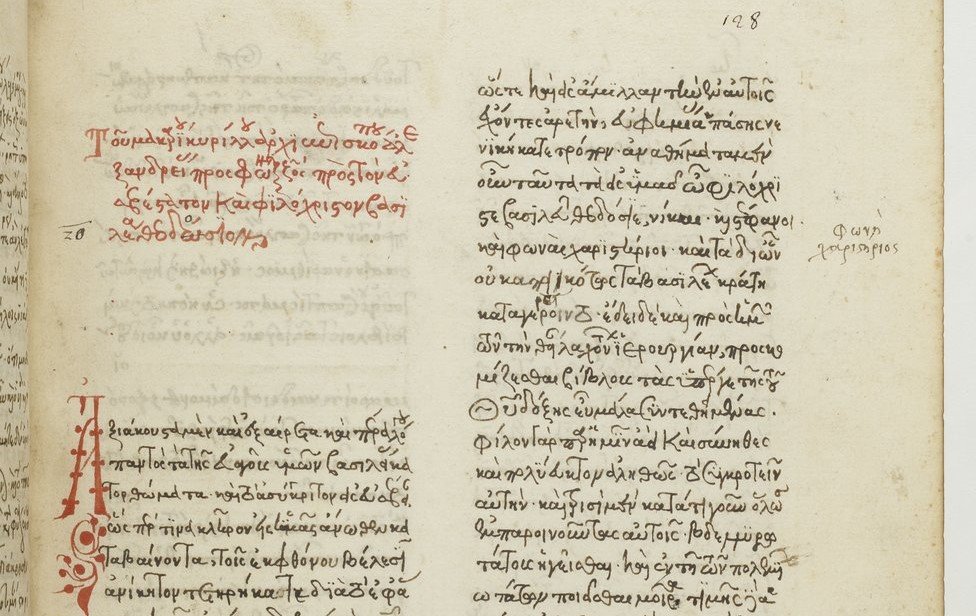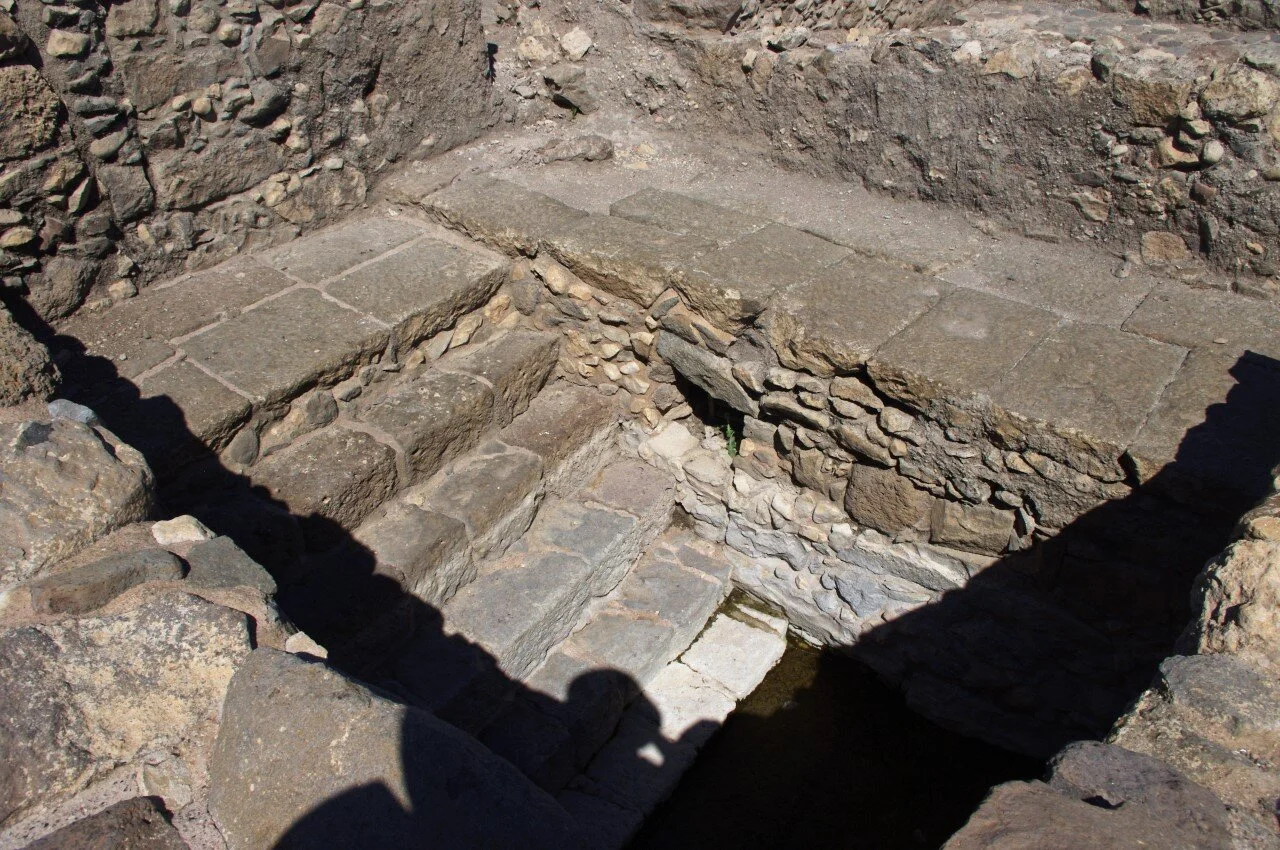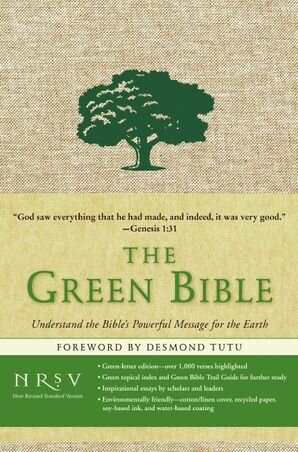To expand thinking around performance and apocalypse, my project incorporates a consideration of gender to these categories. So, in this project, I am concerned with answering the question “is there such a thing as apocalyptic masculinity?”
Read MoreHidden No More: Women in the Parables of Luke
In this study a sustained, interdisciplinary argument is offered for the presence of women in parables where they are not named or explicitly described.
Read MoreCaesarea Maritima and the Ecclesiastical History
Rather than studying the History through a literary lens, my dissertation re-visualizes the texts and the relationships therein through a process of mapping – first, by understanding the city itself and its position among trading cities on the Mediterranean Sea; as I engage with data sets and digital tools to create this method of understanding, it becomes clear how the narrative thread, style, and scope of the History played a role in the text’s reception and legacy.
Read MoreDissertation Spotlight: Rethinking Ancient Jewish Politics: The Hasmonean Dynasty in the Seleukid Empire
Was imperial rule indeed so antithetical to local agency, or was it in fact a facilitating factor in the formation and consolidation of local elite identities? Did the Hasmoneans and their supporters really espouse such an anti-imperial political theology as is often associated with them? What would change in our understanding of emerging Judaism and the Jewish political imagination if we were to reimagine the Hasmonean period without such a heavy emphasis on Jewish national and religious identity in opposition to empire?
Read MoreWhat’s Disgust Got To Do With It? Augustine and the Donatist Controversy
The goal of this dissertation is to provide an example of what insights can be gained when emotions—in particular, disgust—are examined in an archive traditionally mined for theological and historical insights.
Read MoreDissertation Spotlight | Enslavement to God among Early Christians
I wanted to make this intervention because the ubiquity of humans being described as enslaved to God or Christ is easy to miss. As Clarice Martin demonstrated in her 1990 article on womanist biblical interpretation and inclusive translation, scholars and translators have often disguised or euphemized language of enslavement because of a discomfort with acknowledging the presence of enslaved people within the pages of the Bible. I argue that the process of undoing euphemistic translation and uncovering the presence and logics of enslavement in Jewish and Christian literature does not stop with those depicted as enslaved to humans, but extends to those depicted as enslaved to deities.
Read MoreAugustine’s Latin Christian Synthesis
Augustine drew on the central Christian idea of sacramentum—a technical but expansive concept indicating the mysterious conjoining of the sensible to the intelligible, the human to the divine—to produce a unified theory of existence that stands in contrast to the dualisms of his time.
Read MoreRethinking The “People of the Book”
By thinking with premodern Christians as they imagined Muslims and Jews, we can also take a reflexive look at ourselves in the present. How and why do we identify with objects, particularly those from the past?
Read MoreDissertation Spotlight | Disputation as Out-Narration
The implications for our understanding of Julian and Cyril, as well as the ancient traditions they represented and maintained, are enormous. But the implications extend further still, as should be clear from my concluding list of possible indicators that suggest narrative conflict may be at play between rival traditions, past or otherwise.
Read MoreDissertation Spotlight | Representing the Destruction of Jerusalem: Literary Artistry and the Shaping of Memory in 2 Kings 25, Lamentations, and Ezekiel
“I contend, however, that the impetus to reconstruct a historical account of ‘what really happened’ has significantly undertheorized the differing ways in which biblical texts both recount and shape the very idea of destruction of Jerusalem.”
Read MoreBecoming a Man: The Apostle Paul and Masculinity
My doctoral thesis intervenes in this discussion by focusing this relatively new analytical gaze on Paul’s self-presentation in his undisputed letters to argue that the apostle evades straightforward classification as either disrupting or conforming to masculine norms.
Read MoreDissertation Spotlight | Religious Identity and Spatiality in Hasmonean and Herodian Galilee
Ritual immersion pool in a domestic context at Magdala: Photo Credit - Joseph Scales
Ritual immersion pool in a domestic context at Magdala: Photo Credit - Joseph Scales
This thesis answers the following two questions: how did ancient Jews create meaningful spaces of religious activity in ancient Galilee, and how did those spaces in turn influence the constitution of ancient Judaism?
Read MoreDissertation Spotlight | Domestic Labor and Marital Obligations in the Ancient Jewish Household
Terracotta Lekythos by the Amasis Painter depicting women spinning and weaving. Image courtesy of Wikimedia.
Terracotta Lekythos by the Amasis Painter depicting women spinning and weaving. Image courtesy of Wikimedia.
How does a household function? Who owes what to whom, and how did people conceive of their relationships to one another? How did the realities of work in an agricultural society shape these relationships?
Read MoreDissertation Spotlight | Nestorius Latinus: The Latin Reception and Critique of Nestorius of Constantinople
Cassian's foray into Christology has been regarded as a misstep by most scholars who have written on it, though this is an admittedly small cohort. I show instead Cassian’s profound insight into Nestorius' thought.
Read MoreIn Others’ Words: Dialogues and Legitimation in Ancient Jewish and Christian Multivocal Texts
Scholars working in the adjacent fields of Christianity and Judaism in late antiquity have shared a focus on anonymously written Adversus Iudaeos dialogues and rabbinic multivocal narratives, but this common interest has not spurred comparative analysis of Rabbinic and Christian evidence.
Read MoreAffecting Corinth
My dissertation focuses on the role of thinking, feeling, and remembering in the relations between Paul and the Corinthians to demonstrate how social worlds, boundaries, and power structures are (re)produced. I argue that attention to affect prompts a rethinking of the production (or dissolution) of Pauline authority and the concomitant making (or unmaking) of social relationships in the Corinthian assembly.
Read MoreDissertation Spotlight | Christianizing Knowledge
There are several ways to think about the rise of Christianity. I have chosen to tell this story in this manner because I think that it helps to elucidate a number of fascinating shifts in late antiquity, and some of the shifts that I detail continue to reverberate today.
Read MoreTrees and Text: A Material Ecocritical Exploration of Gen. 2:4b–3:24 in The Green Bible
While these two analytical approaches are ostensibly discrete they represent two modes of inquiry that are unique to material ecocritical discourse: ‘matter in text’ and ‘matter as text’, respectively. This approach places trees at the center of my study; narrated trees are the focus of my textual analysis of Gen. 2:4b–3:24 and real-world trees are the primary natural material from which the text of the Green Bible is manufactured.
Read MoreRewriting and (Re)negotiating Gender: A Study of the Depictions of the Matriarchs in the Book of Jubilees
Hans Schilling, “Judith Beheading Holofernes” (detail) in Barlaam and Josaphat, 1469. J. Paul Getty Museum.
Hans Schilling, “Judith Beheading Holofernes” (detail) in Barlaam and Josaphat, 1469. J. Paul Getty Museum.
My dissertation seeks to identify the motives and priorities that guided the author of Jubilees in his rewriting of the biblical stories concerning the matriarchs and asks if Jubilees was unique in its foregrounding of female characters or dealt with them in a manner that was typical of the then literary Zeitgeist.
Read MoreThe Rabbinic Legal Imagination
Talmud Bavli | Bavarian State Library, Munich, Germany, 1342; Ms. 95, page 1152.
Talmud Bavli | Bavarian State Library, Munich, Germany, 1342; Ms. 95, page 1152.
My dissertation offers a new lens into rabbinic legal activity by using close literary analysis of legal passages to show how late rabbinic thought uniquely partakes of broader Sassanian scholastic cultural trends.
Read More








![Medallion with Saint Paul (ca. 1100 CE) [MET Collection]](https://images.squarespace-cdn.com/content/v1/5449167fe4b078c86b41f810/1624968413569-5LRJB13HW7IJ7E0KLT2G/sf17-190-673s1.jpg)


![Paul Gauguin, Christ on the Mount of Olives (1889) Norton Museum of Art [Wikimedia]](https://images.squarespace-cdn.com/content/v1/5449167fe4b078c86b41f810/1617798173133-WJ9CF6D0E3ZJZKWWXCAB/610px-Gauguin-christ-in-garden.jpg)
![Barcelona Disputation [Source: Wikimedia]](https://images.squarespace-cdn.com/content/v1/5449167fe4b078c86b41f810/1604760502956-24438PQOS7JL633XZT4J/Beit_HaTfutzot_20162029-438.jpg)

![Panel from an ivory dyptich of Rufius Probianus, who was vicarius urbis Romae around 400 CE. [Berlin, Staatsbibliothek Ms. theol. lat. fol. 323, Buchkasten].](https://images.squarespace-cdn.com/content/v1/5449167fe4b078c86b41f810/1592842801661-0Y732O4NHSY6BA17T4WU/Unknown.jpeg)


